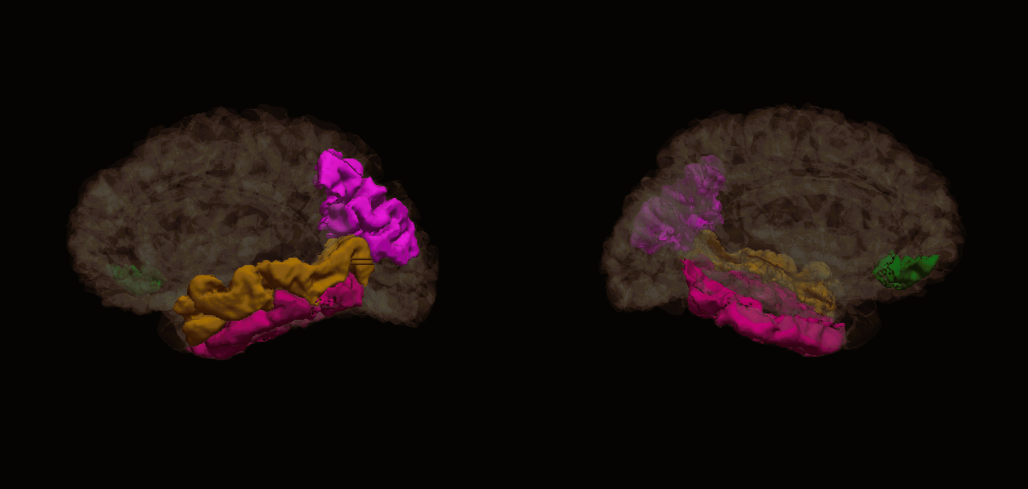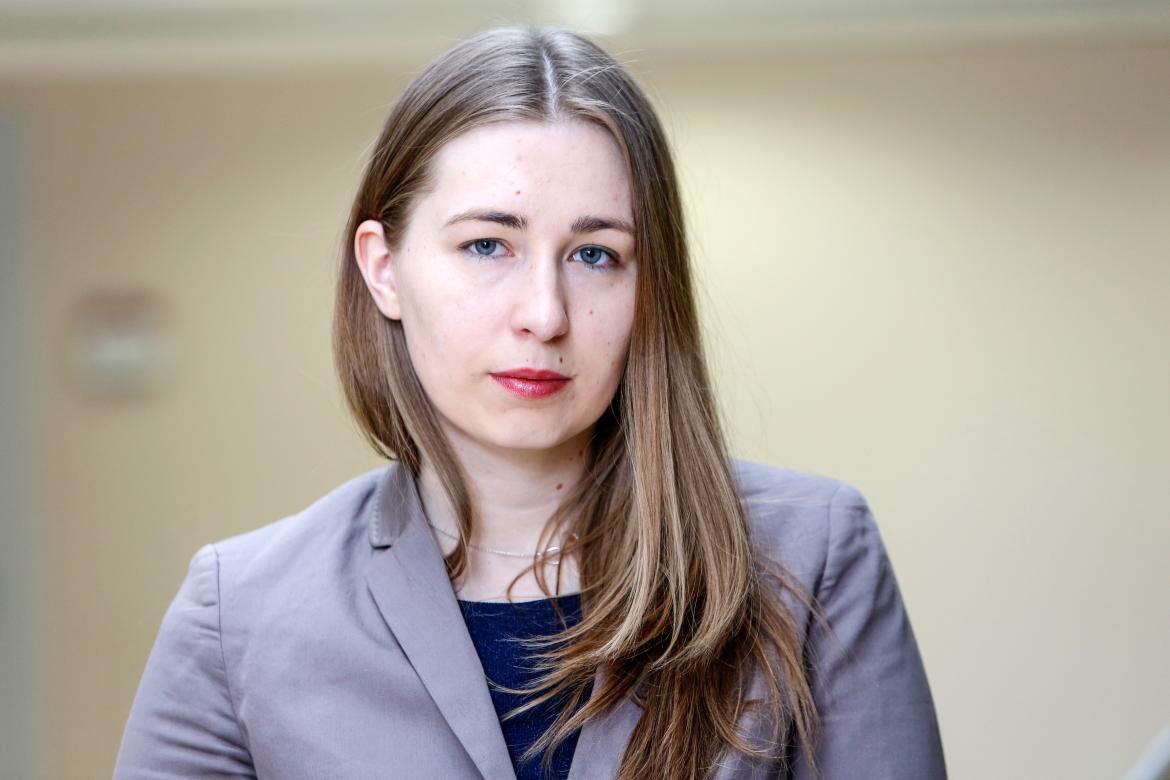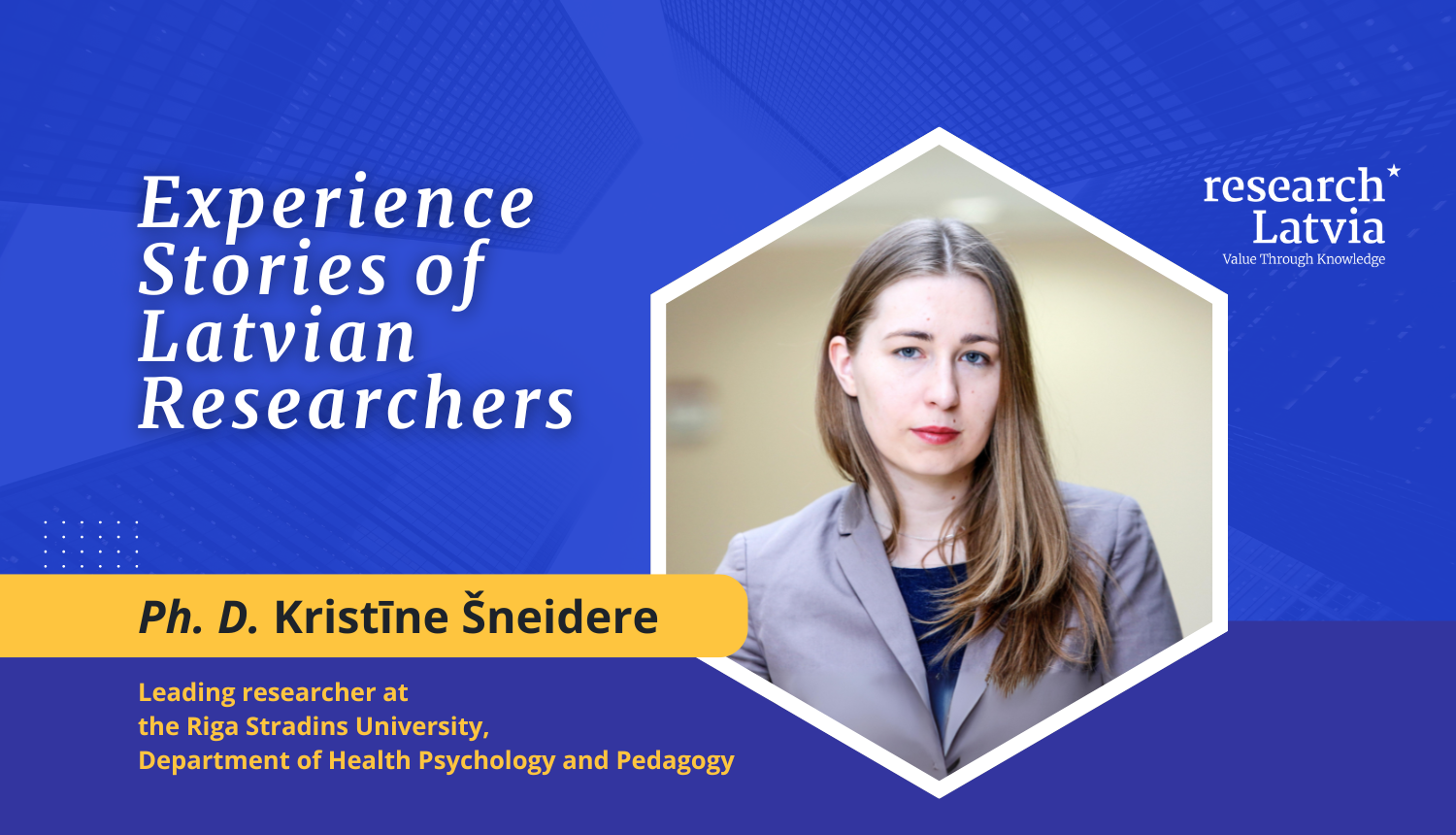PhD Kristīne Šneidere, a leading researcher at the Riga Stradiņš University (RSU), devotes her scientific career to the study of cognitive reserve and aging processes. Currently, she is implementing a postdoctoral project with the student team to develop the innovative Riga Cognitive Screening Test (RiTa), which could become a significant tool for shaping health policy in Latvia. In a conversation with the science communication portal “researchLatvia”, K. Šneidere shares her experiences and inspires future researchers to take their first steps in science.
With passion and conviction, Kristīne emphasizes that each discovery, regardless of its scale, is an important step towards a better understanding of the human brain and aging.
She urges others not to be afraid of challenges, as they open up new scientific perspectives and opportunities that can transform future healthcare.
In 2023, while working at the RSU Department of Health Psychology and Pedagogy, K. Šneidere defended her dissertation on cognitive function and the implications of brain volumetry for older adults without dementia. Her current postdoctoral project focuses on developing tools for early dementia diagnosis, aiming to detect the disease before symptoms appear. Her work with the RiTa test has expanded to include machine learning techniques for a better understanding of cognitive reserve's impact on test scores. “My goal is to develop a test that patients could easily use on daily basis - even while waiting for a doctor’s appointment,” explains the RSU researcher, who has a long-term plan to digitalize this test. Caring for mental health is also essential, and she dreams of introducing dementia screening in Latvia.

Science as Life's Breath: A New Approach to Studying the Brain and Cognitive Processes
Kristīne received her first higher education in English philology, where she studied various subjects during her undergraduate studies, including psychology. She recalls how her career path into science developed naturally: “I accidentally learned about cognitive psychology and neuropsychology, and it fascinated me. Traditionally, many psychologists are driven by a desire to understand how the brain works. I decided to turn this curiosity into my goal.
I enrolled at the RSU, where I began to study statistics, research methodology, and academic writing, and realized that it was so cool, I found it incredibly interesting.”
Her first major academic challenge was participating in the RSU International Student Conference. Despite her anxiety, helped the young researcher to realize her passion for scientific work: "I still remember having butterflies in my stomach and being scared. But when I came out of the conference, I realized that this is what I want to do in my life." Now, as a lecturer, Kristīne encourages her students to apply for conferences and is happy to watch their first steps in research: “I always encourage students to go and try. Some of you will definitely find that spark, while others may not, and that is perfectly fine. But I can promise that some of you will leave the premises with shining eyes and eager to continue. And indeed, it happens.”
During her master's studies, the State Research Program BIOMEDICINE-LV began, and she was invited to participate in the project on aging. At first, she found the topic non-committal: “At that point I was not interested in aging - I was 27 years old and I thought it did not apply to me. When I started reading, I realized that I am not too young, but too old, because I have already started to age."
Over time, as she delved into both methodology and the scientific process, she felt a growing connection to the field: “At one point I realized that I was not just breathing air, I was breathing science. And at that moment, I knew this was my future career path.”

Life Experiences and Brain Activity
Kristīne started her research by examining the link between physical activities and cognitive abilities and brain volume.
Over time, she came to a broader conclusion: cognitive reserve, namely accumulated life experiences, has a greater impact on brain function than physical activity alone.
"To a certain extent, through developing our experience, promoting, learning, working, also simply making new friends, socializing, we train our brain, i.e. we make it more competent to use ourselves. In my dissertation, I examined both brain regions at the cortical level and cognitive processes," explains K. Šneidere, Doctor of Psychological Sciences, who specializes in the subfield of cognitive psychology.
Her observations revealed that people who excel at rote memory tasks often struggle with more complex, less structured tests that require creative thinking and the ability to find unexpected connections. Talking to the doctor and analyzing the results of MRI of the subjects, she discovered that despite the structural changes in the brain, some performed the tests very well. This led her to reconsider the evaluation criteria. “Usually, we could also look at a person's anamnesis to understand the role played by life experience, however it cannot be directly assessed in cognitive tests. This is where the need for objective tests arises, to take out a piece of their influence."
Currently, K. Šneidere is developing the RiTa test. “The purpose of the new test aims to automate the analysis of life experience impacts, using machine learning for objective cognitive assessments. This would help identify the risks of cognitive impairment much more accurately, regardless of a person's life experience," she explains.
Inspiration can Come Unexpectedly
"I really want to say that being a scientist is not just a job or a way of life; it's a way of thinking," says Kristīne.
She continues, "We all know the legend of Sir Newton, who was sitting under an apple tree when an apple fell on his head. At that moment, he was probably not thinking about physics or gravity, but rather catching his breath after a long walk. However, what happened is a typical phenomenon that characterizes a researcher - he experienced an ordinary situation when suddenly a new idea came to mind."
Kristīne shares her experience of getting a sudden inspiration or had a click in head for her next research project while talking with an acquaintance whose partner suffers from dementia: "During the conversation, I came up with an idea for a new project, which I am already working on. The idea came completely unexpectedly - I was on vacation, speaking with someone who has no connection to science. This is one of the sources of inspiration - everyday life. An idea appears, and then you start dressing it up with specific details until it becomes more and more real. And right now, I have about three such “dressed-up” thoughts, and I'm thrilled about them."
However, Kristīne acknowledges that the research process also comes with its challenges. "Of course, science has its downsides. Unfortunately, we know well that a scientist does not always work a standard 40-hour week - sometimes it is only 20 hours because you are waiting for data to be processed or demand is low. But sometimes it is 80 hours when deadlines are looming, or other constraints arise. Researchers are heavily dependent on external factors. At the same time, there are those small, delightful moments that give a dose of dopamine, giving you the strength to continue, and then you know you are on the right path," Kristīne explains.
Early Diagnosis of Dementia: A Path to Better Quality of Life
PhD Kristīne Šneidere emphasizes the critical importance of early dementia diagnosis, which could significantly improve people’s quality of life. Although the number of dementia patients in Latvia seems low, it does not mean that Latvians are healthier. “We often assume that our grandparents’ strange behavior and forgetfulness are normal signs of aging. These are often signs of a disease that could be treated to reduce symptoms. Unfortunately, people often seek help only when symptoms become obvious, but by then, the pathology has progressed, and brain atrophy has already begun,” the researcher notes.
“The goal of my research is to find early markers of dementia so that the disease can be detected even before obvious symptoms appear,” explains the lead researcher at the RSU.
“Although the test developed by our team is used once symptoms are already present, if we could identify and assess cognitive reserves, there is a possibility of detecting the disease earlier, before it has progressed to a more severe stage.”
Early detection of the disease would not only improve patients’ quality of life but also provide an opportunity to plan health policy in the future. Screenings for various diseases already exist in Latvia, but dementia screening has not yet been introduced. This would be an essential component of public mental health monitoring. K. Šneidere explains, "We have seen that giving dementia patients responsibility and tasks can significantly improve their well-being. Preserving quality of life is often more important than simply increasing life expectancy.”
Kristīne also encourages people to overcome their fear of health tests: "People are often afraid of tests because they do not want to discover an illness, yet at the same time, they are afraid of the unknown. However, by taking control of our lives and understanding health risks, we can reduce the impact of the disease. If you know that there is a family history of dementia, there are ways to reduce the risk."
"By overcoming fear and regularly checking our health, we can live fully and with confidence. It is important to remember that not all forms of dementia are genetically inherited.
Physical, cognitive, and social activity are the keys to maintaining health and quality of life," K. Šneidere summarizes.
She emphasizes the importance of building cognitive reserves, pointing out that physical activity, learning, and social engagement are essential factors: "In Latvia, for example, there are Senior Schools where elderly people can learn, socialize, and actively sharpen their minds, reducing risk factors such as loneliness and inactivity."
Growth by Learning Through Mistakes
The researcher comments, “Learning process in science most often occurs through failures and mistakes. Too often in the scientific community success stories are emphasized – we highlight only those cases where everything has worked out perfectly. However, to support the growth of young scientists, it is important to also share failures, challenges, and rejections. Students frequently believe their careers will be at risk if their first publication is accepted by a less prestigious journal. In reality, many researchers do not achieve their goals on the first try. Even Nobel Prize laureates have faced rejections; for example, biochemist Katalin Karikó’s paper was initially rejected by the prestigious journal Nature.”
“Science is full of challenges - hypotheses often go unproven, experiments can fail, but even these results are meaningful. Data from unsuccessful research provides valuable information and should be published so that others can learn from them and avoid similar mistakes.
I always remind my students that failure is an integral part of the scientific process. It is precisely in these moments that growth happens, and new knowledge is gained,” K. Šneidere encourages.
The researcher explains that students often find learning methodology challenging and intimidating. Many students in their 2nd year, when confronted with complex terms like “paradigm” or “experimental study,” feel confused and often even lose interest in science. “It’s completely normal not to understand everything right away, but it is important to find that one field that sparks interest and focus on it. Science is a complex process where growth happens gradually. It is acceptable to only understand part of the process because scientific growth is always incremental,” says Kristīne.
She shares a positive experience: “It is especially inspiring to see how students who initially understand nothing make significant progress over time. This growth is proof of their potential, which we in the academic environment do not always notice. Uncovering and promoting this potential is crucial for the advancement of science. That is why I always encourage students not to fear mistakes and to keep learning, because every failure is a step forward.”
Researcher as a Team Player
When asked what defines a researcher’s profile, Kristīne replies, “Today, the image of a scientist is often seen as an unattainable ideal, reminiscent of stereotyped roles, like the portrayal of women in the movie Barbie. A scientist is expected to be perfect in all areas - able to publish outstanding work prolifically, working over 80 hours a week, while still respecting the boundaries of a 40-hour week to avoid burnout. At the same time, scientists are expected to be both lab experts, knowledgeable in the business world, ready to commercialize their discoveries, and so on. It is a role that demands the ability to make the impossible possible.”
“However, modern science no longer relies on the abilities of one person alone. Interdisciplinarity and teamwork are key to success.
In a study on the effects of physical activity on cognitive functioning and the brain, our team included psychologists, sports science specialists, and a neurologist, but we lacked a radiologist to fully analyze MRI data. This example clearly shows that a scientific team needs a variety of specialists to conduct high-quality and comprehensive research,” admits K. Šneidere.
The researcher highlights the vital role of the teamwork: “Scientists are no longer individual superheroes who can do everything on their own. The scientific field is developing in a healthier direction, where the focus is on collaboration and team knowledge. To ensure project quality and successful outcomes, it is essential to involve methodologists, data analysts, and other experts from specific fields. Together, they can ensure the quality and success of a project.”

From Networking to Storytelling
One of the excellent opportunities for young researchers is to get involved in COST Actions. “I myself have been actively involved in the COST Action PhysAgeNet, where I have had the chance to focus on grant coordination. This kind of experience not only broadens one’s knowledge but also provides the chance to collaborate with recognized scientists from various countries.
This international cooperation fosters the creation of truly high-quality science, grounded in deeper justification and a broader perspective. I highly recommend every young researcher to take advantage of such opportunities to build strong connections and gain valuable experience,” emphasizes Kristīne.
“Make friends and collaborate! One of the most valuable things you can do is network with colleagues, whether they come from your university, another institution, or even a different field. I always enjoy meeting colleagues, sharing ideas, and finding common interests. This not only helps to find research partners but also builds a strong support network - people with whom you can share both professional achievements and as well as moments filled with joy and laughter. Networking provides opportunities to create new projects, plan future publications, and discover new research dimensions,” the scientist expresses.
When it comes to science communication, K. Šneidere encourages, “If the media, universities, or any communication specialists from scientific institutions invite you for a conversation, do not be afraid to say “yes”. It is an opportunity to show that you and your research exist and matter. Another scientist or interested party might read or hear your opinion and recognize similar interests, and it could lead to new collaborations or inspire new ideas. Such expressions not only foster collaboration but also expand your scientific perspective.”
“When communicating with the public, remember that science should be explained simply and humanely. Instead of only talking about numbers and ratios, share stories that create an emotional connection and reveal the significance of the research. Making science accessible to all begins with the ability to connect with society through storytelling.
My wish is for every researcher to be able to turn their discoveries into understandable and captivating stories that encourage understanding and inspire!” says RSU leading researcher.
Kristīne encourages both students and experienced researchers not to fear failures and the challenges of scientific work. Her inspiring words are a reminder that science is a journey where failures are as important as successes. This journey is a continuous effort and immersion in topics that are both complex and inspiring at the same time.
----
About the study
The research is conducted within the project “Internal Consolidation of RSU and External Consolidation of RSU with LSPA,” No. 5.2.1.1.i.0/2/24/I/CFLA/005, as part of the Postdoctoral grant “Development and Validation of the Riga Cognitive Screening Test (RiTa),” No. RSU-PG-2024/1-0011.
----
About the Series of Articles “Experience Stories of Latvian Scientists”
This article series, created by the communication platform of the Ministry of Education and Science “researchLatvia,” provides insights into the work of Latvian researchers, promoting a deeper understanding of the role of science in society and fostering dialogue between scientists and the broader community.
These stories invite both current and future researchers and the society to explore the achievements of Latvian science and draw inspiration and motivation from the experiences of individuals who have dedicated their careers to scientific endeavors. The interviews are conducted as part of Project No. 1.1.1.1/1/24/I/001 “More Efficient and Smarter Implementation and Management of Latvian Science Policy.”
